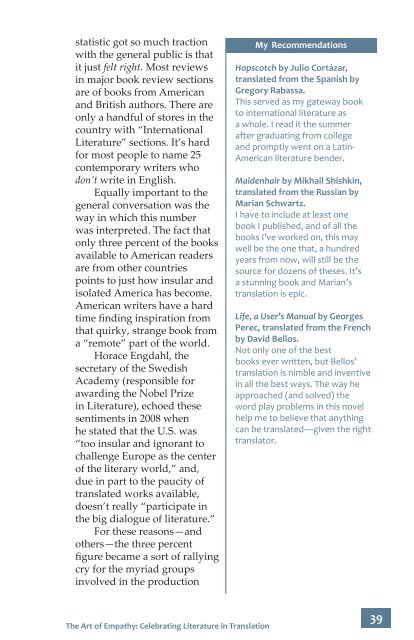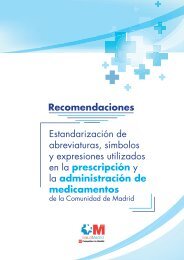lKd7nD
lKd7nD
lKd7nD
Create successful ePaper yourself
Turn your PDF publications into a flip-book with our unique Google optimized e-Paper software.
statistic got so much traction<br />
with the general public is that<br />
it just felt right. Most reviews<br />
in major book review sections<br />
are of books from American<br />
and British authors. There are<br />
only a handful of stores in the<br />
country with “International<br />
Literature” sections. It’s hard<br />
for most people to name 25<br />
contemporary writers who<br />
don’t write in English.<br />
Equally important to the<br />
general conversation was the<br />
way in which this number<br />
was interpreted. The fact that<br />
only three percent of the books<br />
available to American readers<br />
are from other countries<br />
points to just how insular and<br />
isolated America has become.<br />
American writers have a hard<br />
time finding inspiration from<br />
that quirky, strange book from<br />
a “remote” part of the world.<br />
Horace Engdahl, the<br />
secretary of the Swedish<br />
Academy (responsible for<br />
awarding the Nobel Prize<br />
in Literature), echoed these<br />
sentiments in 2008 when<br />
he stated that the U.S. was<br />
“too insular and ignorant to<br />
challenge Europe as the center<br />
of the literary world,” and,<br />
due in part to the paucity of<br />
translated works available,<br />
doesn’t really “participate in<br />
the big dialogue of literature.”<br />
For these reasons—and<br />
others—the three percent<br />
figure became a sort of rallying<br />
cry for the myriad groups<br />
involved in the production<br />
My Recommendations<br />
Hopscotch by Julio Cortázar,<br />
translated from the Spanish by<br />
Gregory Rabassa.<br />
This served as my gateway book<br />
to international literature as<br />
a whole. I read it the summer<br />
after graduating from college<br />
and promptly went on a Latin-<br />
American literature bender.<br />
Maidenhair by Mikhail Shishkin,<br />
translated from the Russian by<br />
Marian Schwartz.<br />
I have to include at least one<br />
book I published, and of all the<br />
books I’ve worked on, this may<br />
well be the one that, a hundred<br />
years from now, will still be the<br />
source for dozens of theses. It’s<br />
a stunning book and Marian’s<br />
translation is epic.<br />
Life, a User’s Manual by Georges<br />
Perec, translated from the French<br />
by David Bellos.<br />
Not only one of the best<br />
books ever written, but Bellos’<br />
translation is nimble and inventive<br />
in all the best ways. The way he<br />
approached (and solved) the<br />
word play problems in this novel<br />
help me to believe that anything<br />
can be translated—given the right<br />
translator.<br />
The Art of Empathy: Celebrating Literature in Translation<br />
39



